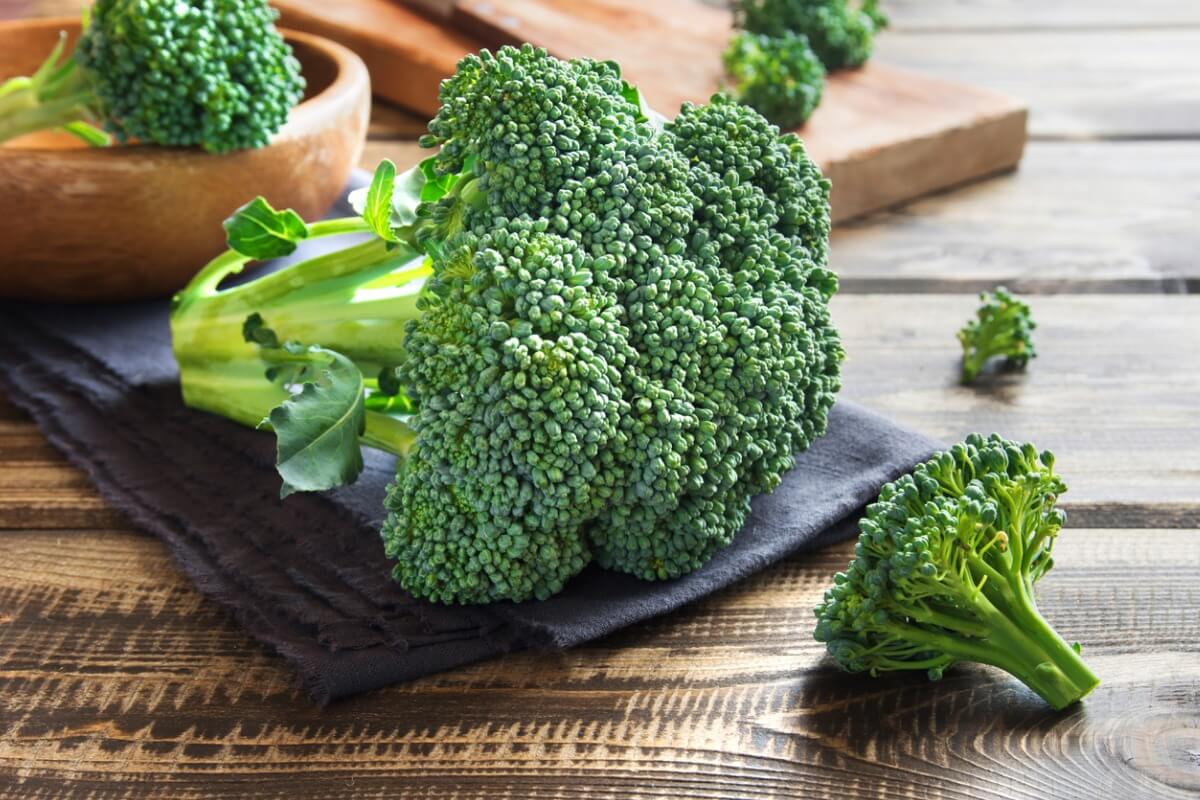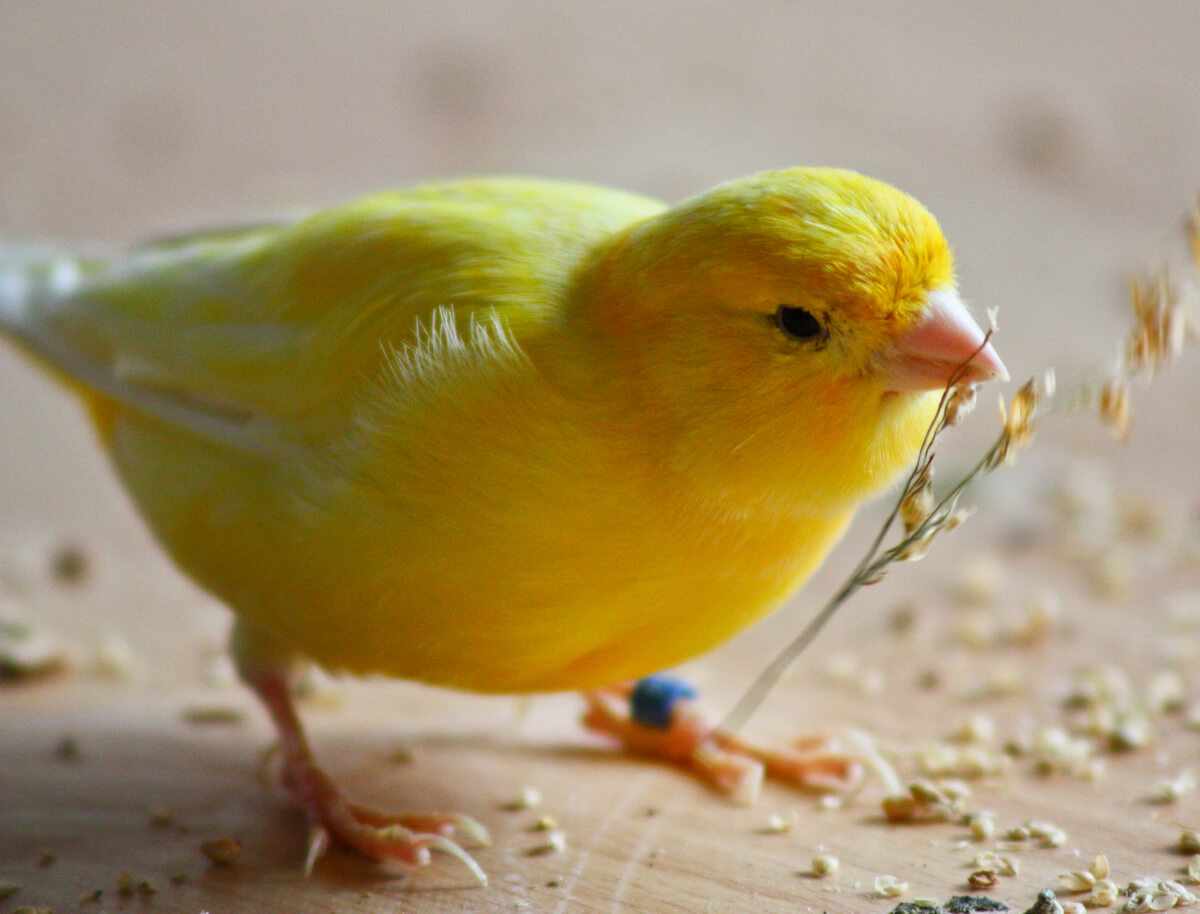The Benefits of Broccoli for Canaries

This vegetable isn’t a favorite for many of us, and it doesn’t have the best of reputations. However, in birds, things are different: broccoli for canaries can be very beneficial to their health and well-being and they love it!
Like all foods, we need to consider different aspects before we include it in an animal’s diet. If you want to know all about its benefits, dosage, and how to serve it, keep reading this space.
Nutritional composition of broccoli
To begin with, we’re going to have a look at the nutritional composition of this vegetable. This is useful information that can guide us as to how much we should include in the bird’s diet. The amounts you are going to see below are per 100 grams (4 oz) of broccoli:
- Energy: 34 kilocalories.
- Water: 89.3 grams.
- Protein: 2.82 grams.
- Fat: 0.37 grams.
- Carbohydrates: 6.64 grams, of which 1.7 grams are sugars.
- Fiber: 2.6 grams.
- Minerals: Broccoli contains calcium (47 mg), iron (0.73 mg), magnesium (21 mg), manganese (0.21 mg), phosphorus (66 mg), potassium (316 mg) and zinc (0.41 mg).
- Vitamins: this vegetable is very rich in vitamins of all groups. It contains vitamin A (31 μg), beta-carotene (361 μg), vitamin C (89.2 mg), thiamine (0.071 mg), riboflavin (0.117 mg), niacin (0.639 mg), pantothenic acid (0.573 mg), vitamin B6 (0.175 mg), folic acid (63 μg), vitamin E (0.78 mg) and vitamin K (101.6 μg).

Indications and benefits of broccoli for canaries
The composition of broccoli doesn’t give very intuitive information about its benefits if you don’t know too much about nutrition. Therefore, here are the main benefits for a canary in simplified form:
- Improves reproductive health: Broccoli provides folic acid (vitamin B9), an essential nutrient for DNA formation, muscle tissue development, and cell regeneration. Pregnant females benefit greatly from this, as it helps them in egg-laying and its intake prevents malformations in fetuses.
- Beauty and physical resistance: The high content in vitamins and minerals in broccoli has a positive general effect on the canary’s appearance, as they’ll be more active, stronger, and will have brighter feathers if they consume this vegetable.
- It fights infections and viruses: Broccoli has a good amount of quercetin and kaempferol, two flavonoid compounds that have anti-inflammatory, antibiotic, antiviral, cardioprotective, and antidepressant properties. In canaries, these substances are very useful in combating colibacillosis and chronic respiratory disease, as well as gout.
- Strengthens the immune system: The fiber, vitamins, and minerals contained in broccoli are essential for strengthening the canary’s natural defenses.
- Improve digestion and intestinal transit: The great contribution of fiber in broccoli is also useful to prevent gastrointestinal problems such as constipation.
- Prevent chronic and degenerative diseases: The flavonoids present in this vegetable have antioxidant properties, which are essential to combat free radicals in the blood. Free radicals damage cells, which accelerates the degeneration of tissues.
As you can see, practically everything about broccoli is advantageous for your canary. Even so, you may wonder how much of this vegetable these birds can consume. Here are some general guidelines.
Broccoli dosage for canaries
There’s no standard dosage for all canaries. Depending on the time of year, the bird’s health, weight, and other factors, its needs may vary.
Broccoli is usually offered every other day at the most, but a female canary that’s going to lay eggs may need it every day. It should also be offered daily in canaries with hypovitaminosis or deficiencies in any mineral contained in broccoli.
If you’re not sure how much broccoli your bird should be eating, consult your veterinarian to create a personalized nutritional plan.
The ideal is to offer this vegetable raw, because, when boiling, it loses almost 80% of its properties. Its tree shape makes it interesting for the birds to peck at, but, if they don’t like doing this, another option is to grate the broccoli and mix it in with their usual food. Remember to wash each piece of broccoli well before offering it to them.
Another option is steamed broccoli, which retains some of its properties better and, moreover, you can crush it and serve it to your canary in this way. This format is more convenient for chicks and older birds. You choose which format is best suited to your specific case.
Contraindications of broccoli for canaries
Like any food, broccoli has contraindications if given in excess. Some of them are the following:
- Diarrhea caused by excess fiber.
- Internal bleeding and clotting and clotting problems: The high concentration of vitamin K, which has an anticoagulant effect, causes wounds not to close at their proper rate. On the other hand, when the blood is too liquid, it can extravasate (be forced out through the veins) and cause internal hemorrhages.

The diet of your canary, as with all other birds, is a fundamental part of their looking after them and ensuring they’re in good health. Taking care of it won’t only help to keep your bird strong and lively, but you’ll also avoid visits to the vet. However, everything requires learning, and until you get to grips with the amounts needed at each stage of your bird’s life, make sure you have the support of a trusted veterinarian.
This vegetable isn’t a favorite for many of us, and it doesn’t have the best of reputations. However, in birds, things are different: broccoli for canaries can be very beneficial to their health and well-being and they love it!
Like all foods, we need to consider different aspects before we include it in an animal’s diet. If you want to know all about its benefits, dosage, and how to serve it, keep reading this space.
Nutritional composition of broccoli
To begin with, we’re going to have a look at the nutritional composition of this vegetable. This is useful information that can guide us as to how much we should include in the bird’s diet. The amounts you are going to see below are per 100 grams (4 oz) of broccoli:
- Energy: 34 kilocalories.
- Water: 89.3 grams.
- Protein: 2.82 grams.
- Fat: 0.37 grams.
- Carbohydrates: 6.64 grams, of which 1.7 grams are sugars.
- Fiber: 2.6 grams.
- Minerals: Broccoli contains calcium (47 mg), iron (0.73 mg), magnesium (21 mg), manganese (0.21 mg), phosphorus (66 mg), potassium (316 mg) and zinc (0.41 mg).
- Vitamins: this vegetable is very rich in vitamins of all groups. It contains vitamin A (31 μg), beta-carotene (361 μg), vitamin C (89.2 mg), thiamine (0.071 mg), riboflavin (0.117 mg), niacin (0.639 mg), pantothenic acid (0.573 mg), vitamin B6 (0.175 mg), folic acid (63 μg), vitamin E (0.78 mg) and vitamin K (101.6 μg).

Indications and benefits of broccoli for canaries
The composition of broccoli doesn’t give very intuitive information about its benefits if you don’t know too much about nutrition. Therefore, here are the main benefits for a canary in simplified form:
- Improves reproductive health: Broccoli provides folic acid (vitamin B9), an essential nutrient for DNA formation, muscle tissue development, and cell regeneration. Pregnant females benefit greatly from this, as it helps them in egg-laying and its intake prevents malformations in fetuses.
- Beauty and physical resistance: The high content in vitamins and minerals in broccoli has a positive general effect on the canary’s appearance, as they’ll be more active, stronger, and will have brighter feathers if they consume this vegetable.
- It fights infections and viruses: Broccoli has a good amount of quercetin and kaempferol, two flavonoid compounds that have anti-inflammatory, antibiotic, antiviral, cardioprotective, and antidepressant properties. In canaries, these substances are very useful in combating colibacillosis and chronic respiratory disease, as well as gout.
- Strengthens the immune system: The fiber, vitamins, and minerals contained in broccoli are essential for strengthening the canary’s natural defenses.
- Improve digestion and intestinal transit: The great contribution of fiber in broccoli is also useful to prevent gastrointestinal problems such as constipation.
- Prevent chronic and degenerative diseases: The flavonoids present in this vegetable have antioxidant properties, which are essential to combat free radicals in the blood. Free radicals damage cells, which accelerates the degeneration of tissues.
As you can see, practically everything about broccoli is advantageous for your canary. Even so, you may wonder how much of this vegetable these birds can consume. Here are some general guidelines.
Broccoli dosage for canaries
There’s no standard dosage for all canaries. Depending on the time of year, the bird’s health, weight, and other factors, its needs may vary.
Broccoli is usually offered every other day at the most, but a female canary that’s going to lay eggs may need it every day. It should also be offered daily in canaries with hypovitaminosis or deficiencies in any mineral contained in broccoli.
If you’re not sure how much broccoli your bird should be eating, consult your veterinarian to create a personalized nutritional plan.
The ideal is to offer this vegetable raw, because, when boiling, it loses almost 80% of its properties. Its tree shape makes it interesting for the birds to peck at, but, if they don’t like doing this, another option is to grate the broccoli and mix it in with their usual food. Remember to wash each piece of broccoli well before offering it to them.
Another option is steamed broccoli, which retains some of its properties better and, moreover, you can crush it and serve it to your canary in this way. This format is more convenient for chicks and older birds. You choose which format is best suited to your specific case.
Contraindications of broccoli for canaries
Like any food, broccoli has contraindications if given in excess. Some of them are the following:
- Diarrhea caused by excess fiber.
- Internal bleeding and clotting and clotting problems: The high concentration of vitamin K, which has an anticoagulant effect, causes wounds not to close at their proper rate. On the other hand, when the blood is too liquid, it can extravasate (be forced out through the veins) and cause internal hemorrhages.

The diet of your canary, as with all other birds, is a fundamental part of their looking after them and ensuring they’re in good health. Taking care of it won’t only help to keep your bird strong and lively, but you’ll also avoid visits to the vet. However, everything requires learning, and until you get to grips with the amounts needed at each stage of your bird’s life, make sure you have the support of a trusted veterinarian.
All cited sources were thoroughly reviewed by our team to ensure their quality, reliability, currency, and validity. The bibliography of this article was considered reliable and of academic or scientific accuracy.
- Ferreiro, B. S., Fernández, C. R., & González, F. G. ¿ Qué Impacto tienen los Rodenticidas Anticoagulantes en las Aves Rapaces?.
- González Molina, C. (2020). Nutrición en aves ornamentales.
- Beleza, A. J. F., Maciel, W. C., Carreira, A. S., Bezerra, W. G., Carmo, C. C., Havt, A., … & Teixeira, R. S. (2019). Detection of Enterobacteriaceae, antimicrobial susceptibility, and virulence genes of Escherichia coli in canaries (Serinus canaria) in northeastern Brazil. Pesquisa Veterinária Brasileira, 39, 201-208.https://www.scielo.br/j/pvb/a/kP5cXMQBQsMQ46HP3w5npXr/?lang=en
This text is provided for informational purposes only and does not replace consultation with a professional. If in doubt, consult your specialist.








